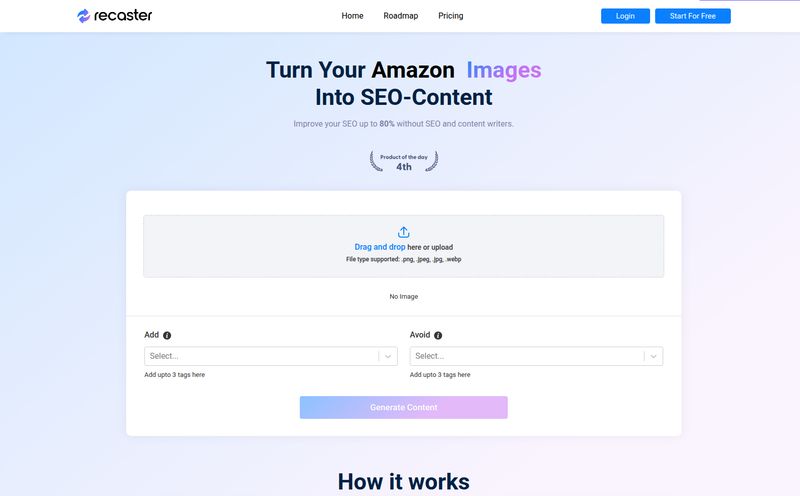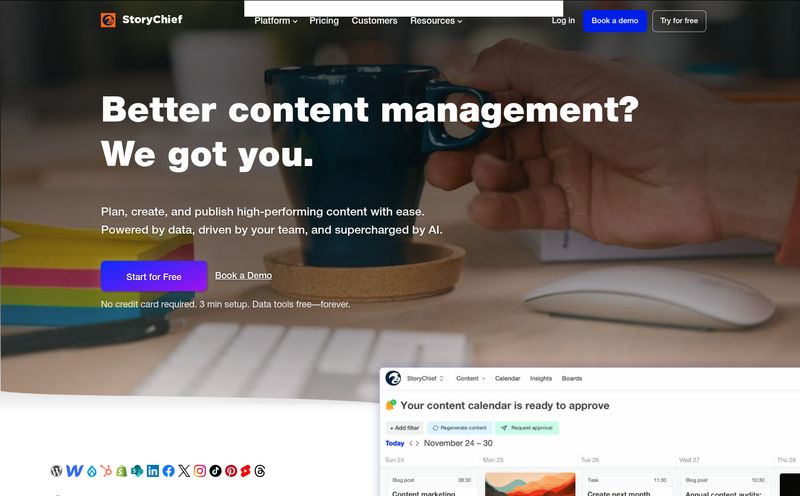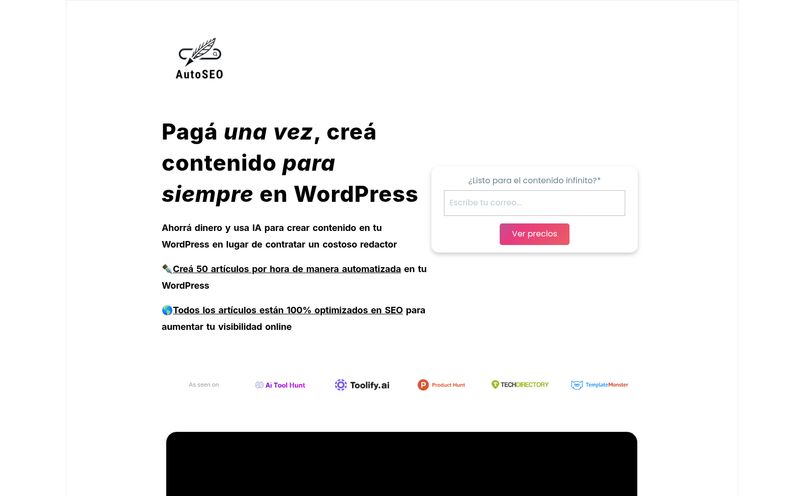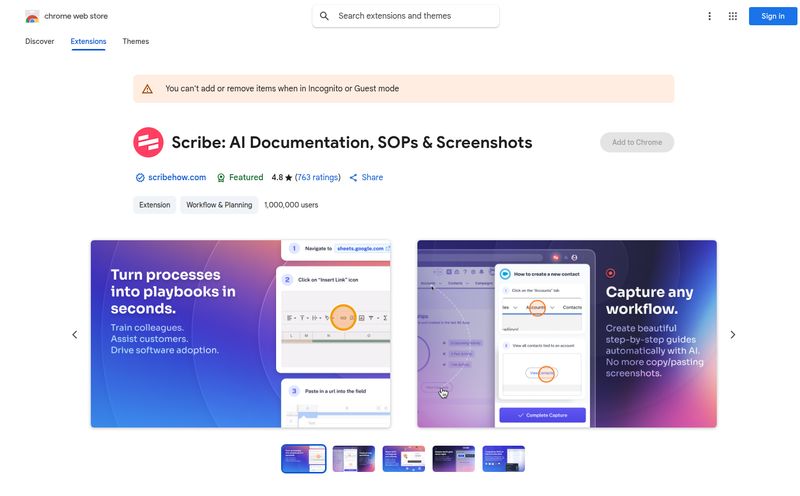The content treadmill is exhausting. As an SEO, I’ve spent more nights than I can count staring at a blinking cursor, fuelled by lukewarm coffee, trying to brainstorm yet another angle for a blog post. We all know the drill: keyword research, outlining, writing, editing, finding images, formatting, publishing... rinse and repeat. It’s a full-time job on top of your actual full-time job.
So whenever a tool comes along promising to automate the whole shebang, my ears perk up. But my skepticism meter goes way up, too. We’ve all seen the robotic, soulless content that early-stage AI writers spat out. It was... not great. But the tech is getting scarily good, and a platform called Meroid.ai has been making some bold claims: “Grow your SEO traffic on autopilot.”
Autopilot? That’s a word that makes marketers either drool or run for the hills. Is it a dream come true, or just another shortcut to a Google penalty? I decided to take a closer look.
So, What's the Big Deal with Meroid.ai?
At its core, Meroid.ai isn't just another AI article spinner. It positions itself as an automated content strategist and publisher. The main hook is that it doesn’t just write a single article based on a prompt you give it. Instead, it analyzes your entire website, figures out who your audience is, and then builds out a whole content plan designed to bring you traffic. And then it writes and publishes it for you.
The promise is simple and powerful: set it and forget it. The idea is that while you're focused on, you know, running your business, Meroid.ai is in the background, acting like a tireless content intern, populating your blog with SEO-optimized articles that are meant to rank on Google and get surfaced by AI search like ChatGPT.
A Look Under the Hood: The 3-Step Process
The whole system is built around a pretty straightforward, three-step workflow. It’s not black magic, but a logical progression that mirrors what a human SEO agency might do, just... a lot faster.
Step 1: The All-Important Site Analysis
First thing's first, you hand over your website URL. Meroid.ai gets to work, crawling your site to understand what you're about. It’s looking at your existing content, your business model, and trying to identify your target audience. This initial analysis is probably the most critical part of the process. Garbage in, garbage out, right? If the AI misunderstands your site's purpose, the content it creates will miss the mark completely.
Step 2: Getting Your Tailored SEO Plan
Once it has a grip on your website, the tool generates a content plan. From the looks of it, this is a 30-day calendar of article topics. This isn’t just a random list of keywords. It’s a strategy designed to build topical authority and target queries your customers are actually searching for. You get to see what it plans to write before it goes to work, which provides a much-needed layer of human oversight.
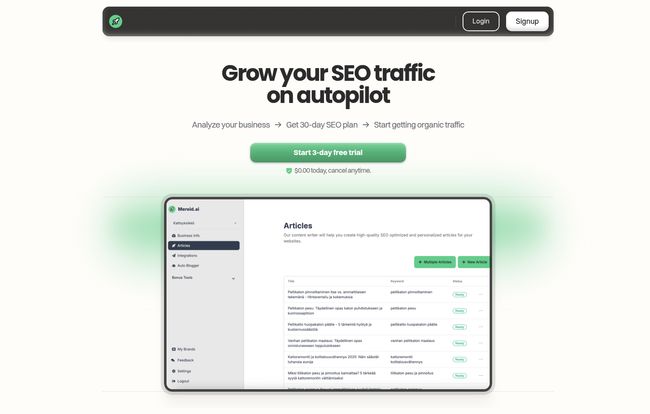
Visit Meroid.ai
Step 3: The Magic of Automated Growth
After you approve the plan, Meroid.ai takes over. It writes the articles, optimizes them for search engines (we'll get into that), and—this is a big one—publishes them directly to your website. It integrates with major CMS platforms, so you don't have to copy-paste anything. You just watch your analytics and, hopefully, see that sweet, sweet organic traffic start to climb.
The Features That Actually Matter for SEO
Any tool can stuff keywords into a paragraph. What I care about are the features that show a deeper understanding of how SEO works in 2024. Meroid.ai has a few that caught my eye.
- Customizable Brand Voice: This is huge. The biggest giveaway of AI content is a generic, bland tone. Meroid.ai claims you can teach it your brand's specific voice, style, and tone. If this works as advertised, it could be a game-changer for maintaining brand consistency, which is something I'm a real stickler for.
- Automated Internal Linking: I geeked out a little when I saw this. Proper internal linking is one of the most underrated SEO tactics for building topical authority and passing link equity. It’s also tedious as hell to do manually, especially on a large site. Automating this? Chef's kiss.
- Support for 50+ Languages: For businesses targeting international markets, this is a massive win. Spinning up a content strategy in German or Spanish or Japanese with the same tool is incredibly efficient.
But Does Google Hate AI Content?
Ah, the million-dollar question. The elephant in the room. For years, the SEO community has been terrified of being penalized for using AI. But here’s the thing—Google’s stance has evolved. I was reading one of their recent posts on the Search Central blog, and they’ve made it pretty clear: they don’t care if content is written by a human, an AI, or a team of highly-trained monkeys.
What they care about is whether the content is helpful, reliable, and people-first. They want content that demonstrates experience, expertise, authoritativeness, and trustworthiness (E-E-A-T). The challenge for a tool like Meroid.ai isn't to trick Google; it's to produce content that genuinely meets these criteria. If it creates well-researched, well-structured, helpful articles that answer a user's query, Google will reward it. If it pumps out thin, repetitive garbage, it will be ignored. The tool is only as good as the strategy and the final output.
Let's Talk Money: The Meroid.ai Investment
Okay, so what does this automated content machine cost? The main plan they advertise is the 'Accelerator' plan at 99€ per month.
Here's a quick breakdown of what that gets you:
| Plan | Price | What's Included |
| Accelerator | 99€ / month | 30 articles per month, tailored SEO strategy, automated publishing, own brand voice, and internal linking. |
At first glance, 99€ might seem like a lot for a software subscription. But let's put it in perspective. Hiring a decent freelance writer will cost you, at a bare minimum, €50-€100 per article. Thirty articles would set you back thousands. An SEO agency? Even more. When you do the math, 99€ for 30 articles comes out to about €3.30 per article. That’s… incredibly cost-effective, almost unbelievably so. The value proposition here isn’t just the content itself, but the time and money saved on strategy, writing, and publishing.
The Good, The Bad, and The Realistic
No tool is perfect. After digging in, here’s my honest take on the pros and cons.
The Good Stuff
The time-saving aspect is undeniable. For a small business owner or a solo marketer, getting 30 articles published a month without lifting a finger is a dream. The cost-effectiveness is also a massive plus. It democratizes content strategy for those who can't afford a big agency. And the inclusion of smart features like internal linking and brand voice shows they're thinking beyond simple article generation.
The Potential Downsides
My biggest concern is always originality. Even with a custom brand voice, there's a risk of the content feeling a bit… uniform. You lose the unique spark, the personal anecdotes, the creative flair that a human writer can bring. I'd personally use the generated content as a very solid first draft and then have a human editor spend 15-20 minutes polishing it, adding personal insights, and fact-checking. Also, the 99€ price point, while a bargain compared to human writers, could still be a stretch for a brand-new startup with zero budget.
My Final Verdict: Who is Meroid.ai For?
So, is Meroid.ai the future of SEO content? Maybe. Or at least a big part of it.
This tool isn't for the Fortune 500 company with a massive in-house content team dedicated to writing thought leadership epics. It’s for the rest of us. It’s for the small business owner who knows they should be blogging but doesn't have the time. It’s for the affiliate marketer looking to scale up multiple niche sites. It's for the digital agency trying to provide more value to clients without tripling their retainer fees.
I see it not as a replacement for human creativity, but as a powerful force multiplier. It handles the 80% of grunt work involved in content production, freeing you up to focus on the 20% that truly matters: high-level strategy, building relationships, and adding that final human touch that AI just can't replicate. Yet.
If you're drowning in content demands and looking for a life raft, Meroid.ai is definitely worth a look. It might just be the autopilot system your business has been waiting for.
Frequently Asked Questions about Meroid.ai
- 1. Will using Meroid.ai get my site penalized by Google?
- Highly unlikely, as long as the content is high-quality. Google's official stance is that they reward helpful content, regardless of how it's created. The focus is on quality and user experience, not the author (human or AI).
- 2. How customizable is the 'brand voice' feature?
- Meroid.ai claims it analyzes your existing content to learn your style, tone, and specific phrasing. While it won't be a perfect 1-to-1 match for a human writer, the goal is to ensure consistency and avoid the generic AI sound. It's a significant step up from standard AI writers.
- 3. Can I edit the articles before they are published?
- The workflow involves you approving a content plan. While the platform is designed for full automation, a smart approach would be to review the published articles and make minor tweaks or additions to inject more personality and ensure factual accuracy. You always retain full control over your own website's content.
- 4. Is 30 articles per month too much for a new blog?
- For a brand new site, 30 articles in the first month is an aggressive but effective way to build a foundation of content and signal to Google what your site is about. For an established site, it's a solid cadence to maintain topical relevance and consistently target new keywords.
- 5. What kind of websites would benefit most from Meroid.ai?
- Service-based businesses, local businesses, e-commerce stores with a blog, affiliate niche sites, and marketing agencies managing multiple clients are all prime candidates. Essentially, any business that relies on organic search traffic but is constrained by time and resources for content creation.
- 6. Is there a free trial available?
- The website mentions a 'Start 7-day free trial' button, so you can test out the platform and see the initial site analysis and content plan before committing to a paid subscription.
Reference and Sources
- Meroid.ai Official Website
- Meroid.ai Pricing Page
- Google Search's guidance about AI-generated content (Google Search Central Blog)
